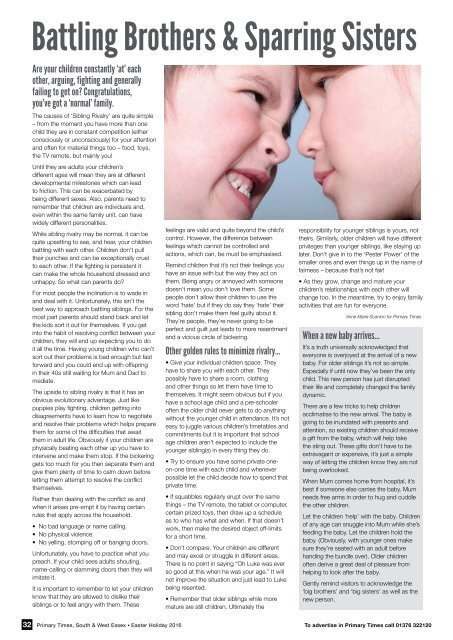PTEssex_SOUTH_i94_Opt
Primary Times in North & Mid Essex
Primary Times in North & Mid Essex
Create successful ePaper yourself
Turn your PDF publications into a flip-book with our unique Google optimized e-Paper software.
Battling Brothers & Sparring Sisters<br />
Are your children constantly ‘at’ each<br />
other, arguing, fighting and generally<br />
failing to get on? Congratulations,<br />
you’ve got a ‘normal’ family.<br />
The causes of ‘Sibling Rivalry’ are quite simple<br />
– from the moment you have more than one<br />
child they are in constant competition (either<br />
consciously or unconsciously) for your attention<br />
and often for material things too – food, toys,<br />
the TV remote, but mainly you!<br />
Until they are adults your children’s<br />
different ages will mean they are at different<br />
developmental milestones which can lead<br />
to friction. This can be exacerbated by<br />
being different sexes. Also, parents need to<br />
remember that children are individuals and,<br />
even within the same family unit, can have<br />
widely different personalities.<br />
While sibling rivalry may be normal, it can be<br />
quite upsetting to see, and hear, your children<br />
battling with each other. Children don’t pull<br />
their punches and can be exceptionally cruel<br />
to each other. If the fighting is persistent it<br />
can make the whole household stressed and<br />
unhappy. So what can parents do?<br />
For most people the inclination is to wade in<br />
and deal with it. Unfortunately, this isn’t the<br />
best way to approach battling siblings. For the<br />
most part parents should stand back and let<br />
the kids sort it out for themselves. If you get<br />
into the habit of resolving conflict between your<br />
children, they will end up expecting you to do<br />
it all the time. Having young children who can’t<br />
sort out their problems is bad enough but fast<br />
forward and you could end up with offspring<br />
in their 40s still waiting for Mum and Dad to<br />
mediate.<br />
The upside to sibling rivalry is that it has an<br />
obvious evolutionary advantage. Just like<br />
puppies play fighting, children getting into<br />
disagreements have to learn how to negotiate<br />
and resolve their problems which helps prepare<br />
them for some of the difficulties that await<br />
them in adult life. Obviously if your children are<br />
physically beating each other up you have to<br />
intervene and make them stop. If the bickering<br />
gets too much for you then separate them and<br />
give them plenty of time to calm down before<br />
letting them attempt to resolve the conflict<br />
themselves.<br />
Rather than dealing with the conflict as and<br />
when it arises pre-empt it by having certain<br />
rules that apply across the household.<br />
• No bad language or name calling.<br />
• No physical violence.<br />
• No yelling, stomping off or banging doors.<br />
Unfortunately, you have to practice what you<br />
preach. If your child sees adults shouting,<br />
name-calling or slamming doors then they will<br />
imitate it.<br />
It is important to remember to let your children<br />
know that they are allowed to dislike their<br />
siblings or to feel angry with them. These<br />
feelings are valid and quite beyond the child’s<br />
control. However, the difference between<br />
feelings which cannot be controlled and<br />
actions, which can, be must be emphasised.<br />
Remind children that it’s not their feelings you<br />
have an issue with but the way they act on<br />
them. Being angry or annoyed with someone<br />
doesn’t mean you don’t love them. Some<br />
people don’t allow their children to use the<br />
word ‘hate’ but if they do say they ‘hate’ their<br />
sibling don’t make them feel guilty about it.<br />
They’re people, they’re never going to be<br />
perfect and guilt just leads to more resentment<br />
and a vicious circle of bickering.<br />
Other golden rules to minimize rivalry...<br />
• Give your individual children space. They<br />
have to share you with each other. They<br />
possibly have to share a room, clothing<br />
and other things so let them have time to<br />
themselves. It might seem obvious but if you<br />
have a school age child and a pre-schooler<br />
often the older child never gets to do anything<br />
without the younger child in attendance. It’s not<br />
easy to juggle various children’s timetables and<br />
commitments but it is important that school<br />
age children aren’t expected to include the<br />
younger sibling(s) in every thing they do.<br />
• Try to ensure you have some private oneon-one<br />
time with each child and whenever<br />
possible let the child decide how to spend that<br />
private time.<br />
• If squabbles regularly erupt over the same<br />
things – the TV remote, the tablet or computer,<br />
certain prized toys, then draw up a schedule<br />
as to who has what and when. If that doesn’t<br />
work, then make the desired object off-limits<br />
for a short time.<br />
• Don’t compare. Your children are different<br />
and may excel or struggle in different areas.<br />
There is no point in saying “Oh Luke was ever<br />
so good at this when he was your age.” It will<br />
not improve the situation and just lead to Luke<br />
being resented.<br />
• Remember that older siblings while more<br />
mature are still children. Ultimately the<br />
responsibility for younger siblings is yours, not<br />
theirs. Similarly, older children will have different<br />
privileges than younger siblings, like staying up<br />
later. Don’t give in to the ‘Pester Power’ of the<br />
smaller ones and even things up in the name of<br />
fairness – because that’s not fair!<br />
• As they grow, change and mature your<br />
children’s relationships with each other will<br />
change too. In the meantime, try to enjoy family<br />
activities that are fun for everyone.<br />
When a new baby arrives...<br />
Anne Marie Scanlon for Primary Times<br />
It’s a truth universally acknowledged that<br />
everyone is overjoyed at the arrival of a new<br />
baby. For older siblings it’s not so simple.<br />
Especially if until now they’ve been the only<br />
child. This new person has just disrupted<br />
their life and completely changed the family<br />
dynamic.<br />
There are a few tricks to help children<br />
acclimatise to the new arrival. The baby is<br />
going to be inundated with presents and<br />
attention, so existing children should receive<br />
a gift from the baby, which will help take<br />
the sting out. These gifts don’t have to be<br />
extravagant or expensive, it’s just a simple<br />
way of letting the children know they are not<br />
being overlooked.<br />
When Mum comes home from hospital, it’s<br />
best if someone else carries the baby. Mum<br />
needs free arms in order to hug and cuddle<br />
the other children.<br />
Let the children ‘help’ with the baby. Children<br />
of any age can snuggle into Mum while she’s<br />
feeding the baby. Let the children hold the<br />
baby. (Obviously, with younger ones make<br />
sure they’re seated with an adult before<br />
handing the bundle over). Older children<br />
often derive a great deal of pleasure from<br />
helping to look after the baby.<br />
Gently remind visitors to acknowledge the<br />
‘big brothers’ and ‘big sisters’ as well as the<br />
new person.<br />
32<br />
Primary Times, South & West Essex • Easter Holiday 2016<br />
To advertise in Primary Times call 01376 322120
















